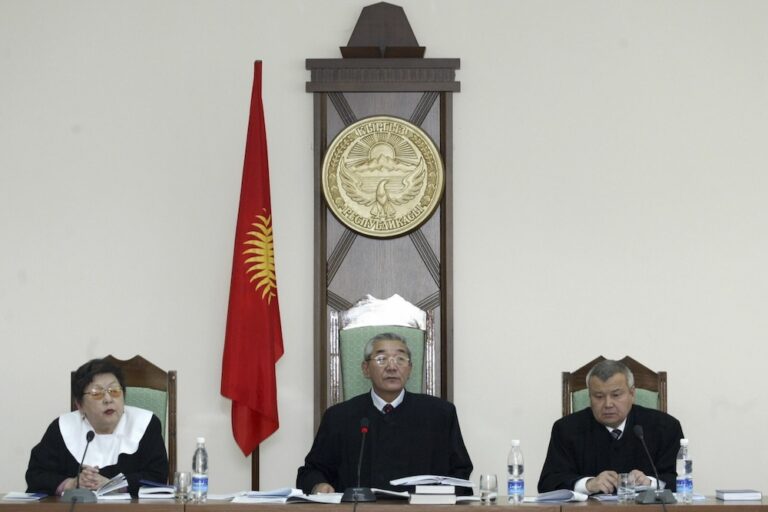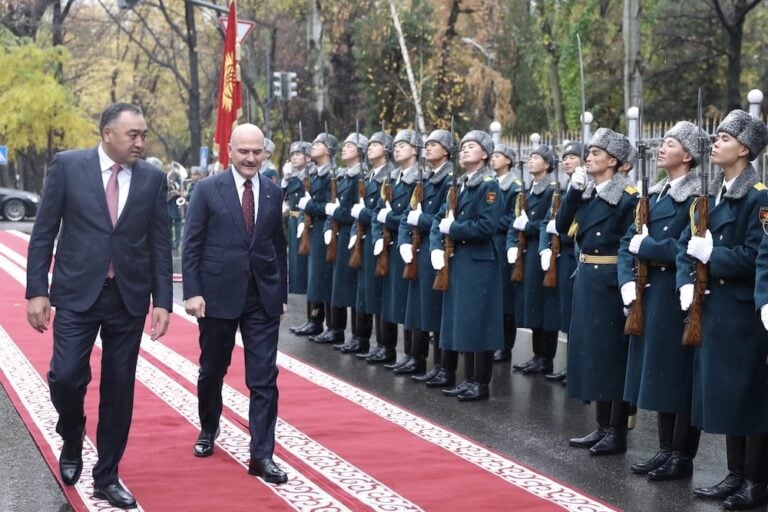(CPJ/IFEX) – In a 20 March 2001 letter to President Askar Akayev, CPJ said it was deeply disturbed by the government’s recent crackdown on independent and opposition media in Kyrgyzstan, exemplified by the recent closure of the opposition twice-weekly newspaper “Asaba” and the suspension of the independent weekly “Res Publica”. CPJ believes the Kyrgyz government, […]
(CPJ/IFEX) – In a 20 March 2001 letter to President Askar Akayev, CPJ said it was deeply disturbed by the government’s recent crackdown on independent and opposition media in Kyrgyzstan, exemplified by the recent closure of the opposition twice-weekly newspaper “Asaba” and the suspension of the independent weekly “Res Publica”.
CPJ believes the Kyrgyz government, along with companies and individuals reportedly close to it, are using tax laws and other legal tools at their disposal in an effort to silence popular publications that have criticized the president’s regime.
On 13 February, a local court in Bishkek ordered the Uchkun Publishing House to cease printing “Res Publica” until it had paid off two overdue libel fines. At the time of the ruling, “Res Publica” owed damages of 70,000 soms (about US$1,500) to Amanbek Karypkulov, president of the National Radio and Television Corporation (NRTC), and local politician Sadyrbek Botaliev for allegedly violating their “honor and dignity.” The fines were imposed in 1999 and 2000 respectively (see IFEX alerts of 5 April and 24 March 2000).
The weekly did not appear on 27 February and 6 March, since the paper’s bank accounts were frozen by court order. Lacking sufficient funds to pay the fines, “Res Publica” turned to local political parties and non-profit organizations for help. After raising the necessary money and paying off the fines, the paper resumed publication on 13 March.
On 6 March, meanwhile, another Bishkek court ordered Uchkun not to print further issues of “Asaba”, the oldest and most popular Kyrgyz-language publication in the country, until it had paid fines and damages totaling eight million soms (about US$160,000), including an unprecedented US$100,000 damage award to parliamentary deputy Turdakun Usubaliev. The court also ruled that any money coming into the newspaper’s bank accounts would be garnished to pay the fines.
For two weeks in March, articles by “Asaba” journalists appeared in “Res Publica”. But when officials began confiscating “Asaba”‘s property on 15 March, they also impounded 3,000 kilograms of newsprint stored at Uchkun. This effectively blocks the publication of both newspapers, since “Res Publica” has no paper reserves of its own. On 19 March, “Asaba”‘s owner announced that the newspaper was suspending publication indefinitely. Because the joint project with “Res Publica” had not been profitable, he said, “Asaba” would have to seek other solutions for its financial problems.
“Asaba”‘s effective closure followed several years of harassment from Kyrgyz tax authorities. In 1998, authorities demanded some US$42,000 in allegedly overdue taxes. The charges were dropped last year. But on 27 February, chief tax official Aziz Momunkulov again charged the newspaper with tax evasion.
The newspaper’s financial troubles were exacerbated by a financial dispute with the Kumtor Operating Company (a subsidiary of Canada’s Cameco Corporation), which reportedly has close links to the Kyrgyz government. Kumtor claims that the newspaper owes it over million soms (about US$22,000). “Asaba” disputed the claim in the Court of Appeals, which on 20 February ruled in favor of Kumtor.
Recommended Action
Send appeals to the president:
– condemning the ongoing harassment of “Asaba” and “Res Publica”
– urging him to ensure that official persecution of these publications ceases at once, and that both newspapers are allowed to print without further impediment
Appeals To
APPEALS TO:
His Excellency Askar Akayev
President of Kyrgyzstan
Kirov St. 205
Bishkek, Kyrgyzstan
Fax: +996 312 218 627
Please copy appeals to the source if possible.


